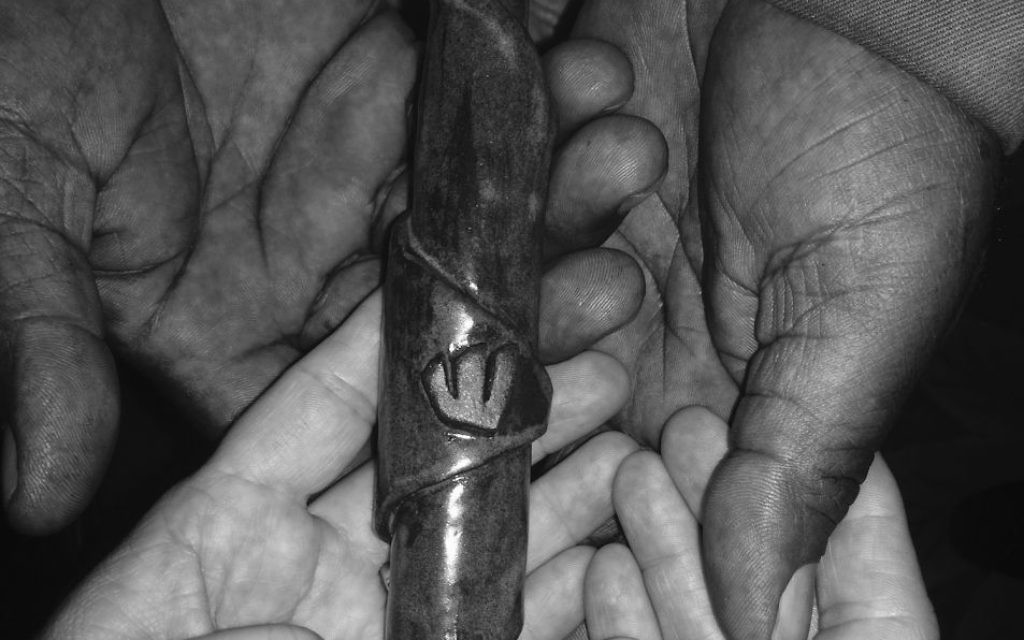Ethiopian Jews Hide Passover Observance
The Bal Ej worship in secret synagogues to avoid discrimination, killings
A pre-Talmudic Jewish community in Ethiopia times its celebration of Passover with Easter to shield itself from anti-Semitism.
“We are discriminated against in school because they believe we are human by day and hyenas at night,” said Abebe Debay, a member of the Bal Ej Jews, the subject of the film “The Hidden Jews of Ethiopia.”
The Bal Ej Jews broke from the Beta Israel Jews in Gondar 300 years ago.
Get The AJT Newsletter by email and never miss our top stories Free Sign Up
It was officially announced there were no more Jews in Ethiopia after the rescue of about 2,000 Falash Mura Jewish families through Projects Solomon and Moses in the late 1980s and early 1990s. But when filmmaker Irene Orleansky, along with Melissa Toporek, traveled to the neighborhood of Kechene in Addis Ababa, Ethiopia, they documented the Bal Ej and their long-forgotten pre-Talmudic Jewish practices.
“Thank you for writing about my people and our community,” Debay said. “Our identity is not openly known. We do not reveal our identity because of killing and discrimination.”
Debay and Toporek, who are married, are members of Congregation Bet Haverim.
The Bal Ej, whose name mean craftsman, live in secret, masquerading as Christians in public but practicing Judaism behind closed doors.
“The insult and suffering is because of religion. The Coptic church encourages persecution,” Debay said. “If someone is sick from the community, they assume they have the evil eye from Jews.”
For centuries the group faced discrimination by the Coptic Christian majority and as a result observed Judaism through a system of secret synagogues and rituals. On Shabbat the Bal Ej Jews bake Shabbat
bread that can be eaten only by members inside the secret synagogue.
“The priest comes to check your house to see if there is a picture of Jesus,” Debay said. “They know we do things hidden, but they don’t know about the hidden synagogues.”
The Bal Ej do not feel as threatened in Addis Ababa as they did in Gondar, but Debay said they are always reminded that they are considered second-class citizens.
“They do not allow us to serve in the Coptic Christian Church because they believe we killed Jesus,” Debay said. “We still outwardly practice Christianity, but they know we descended from Jews.”
For Passover, the Bal Ej begin celebrating at Easter, and the holiday lasts seven days. In the hidden synagogues, oxen are slaughtered in a kosher way, and blood is spilled by the door and smeared on foreheads.
“We stay in synagogue as long as blood is on the forehead. The holiday is celebrated under Christian Easter so no one suspects it’s a different practice,” Debay said.
During the seven days of Passover, the Bal Ej who are potters, taxi drivers, weavers and blacksmiths refrain from work. They eat dorowot, a traditional stew made with chicken, spices, red pepper, garlic and onion. They pass time playing card games and gambling, Debay said, because gambling is permitted during festivals.
“We don’t do nothing,” he said. “For seven days we go around to different houses and eat doro wot. If a couple is married, it is required they take doro wot to their parents’ house at night and eat it all together.”
Like Jews who observe Passover in the Western tradition, the Jews of Addis Ababa do not eat bread, and they thoroughly clean their homes before the festival.
The younger generation established an open synagogue in the neighborhood where they eat matzah.
“We used to go there and eat matzah to have a common religious practice with the West,” Debay said.
In general, the Bal Ej Jews are not interested in adopting Western practices or seeking acknowledgment from the Israeli government. Toporek, who is married to Debay, said a rabbi tried to start the process of official recognition, but it’s difficult to measure pre-Talmudic Jews using Western standards.
“From the perspective of the state of Israel, they don’t understand the recordkeeping,” Toporek said. “They can’t walk in with their parents’ ketubah and say, ‘I want to make aliyah.’ The process for Westerners is different from the process for non-Westerners.”
Debay learned he was Jewish like most Jews around the world, and
Toporek doesn’t like using a set of standards to validate someone who falls outside the current Jewish homogeneity.
“The rabbi asked him, ‘Who told you you are Jewish?’ and he said, ‘My mother. Who told you you were Jewish?’ and the rabbi said, ‘My mother.’ ”
There are no photos or Jewish wedding contracts to prove the Bal Ej’s Jewish lineage, but Toporek embraces her husband’s identity. While Toporek was working in Ethiopia, she worshipped with the Bal Ej.
“I came across the community while working there for three months. I was really looking for a place to celebrate Shabbat,” Toporek said. “When I met them and participated in the festivals and rituals, it felt like home.”
In Atlanta, Debay is learning to practice Talmudic rituals. He said he must always practice Judaism, whether in the United States or in Ethiopia.
“Every religious activity done is because we should not be separated from the city of David. Many believe it’s not in Israel but in heaven,” Debay said. “We don’t have the right to own land (in Ethiopia), and we’re persecuted because we prefer to have the city of David.”








comments